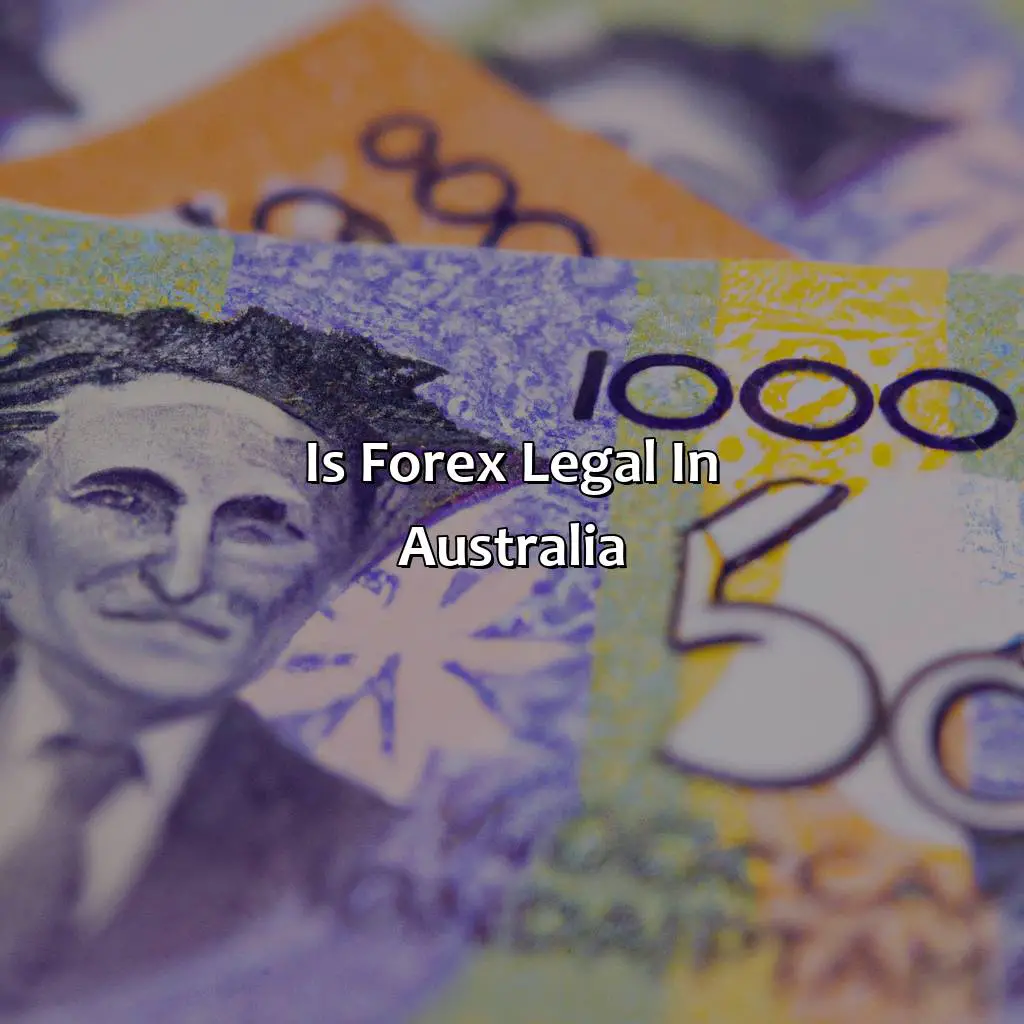
Key Takeaways:
- Forex trading is legal in Australia but is heavily regulated by the Australian Securities and Investments Commission (ASIC), which oversees the licensing of forex brokers and ensures that they comply with strict financial regulations.
- Tax implications on forex trading in Australia depend on a variety of factors, including the trader’s income, the length of time they have been trading, and the type of financial instrument they are trading.
- In addition to the potential for high profits, forex trading in Australia also carries risks such as volatility and leverage hindrances, security concerns with trading platforms, and fraudulent activities from scammers. Traders should be aware of these risks and take necessary precautions to protect their investments.
Overview of Forex Trading in Australia
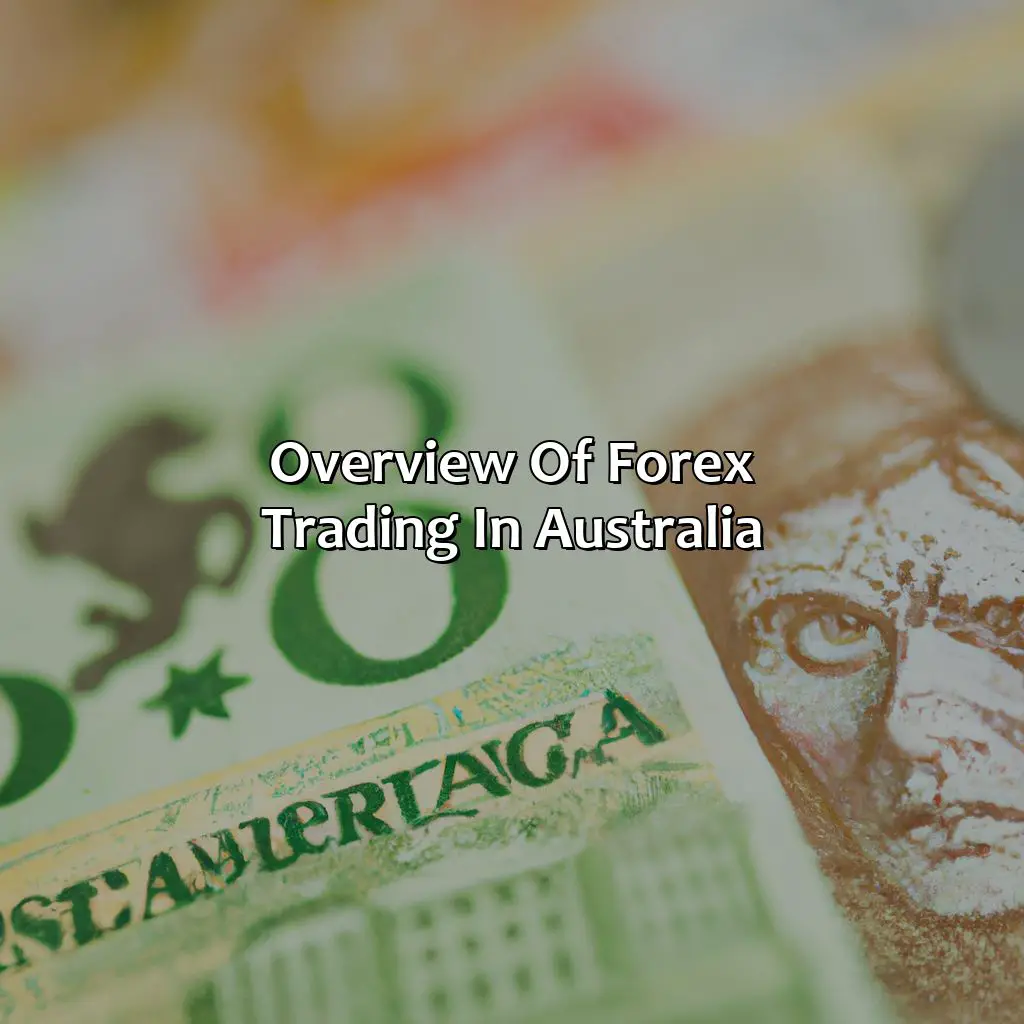
Photo Credits: forexbrokerreport.com by Austin Flores
Forex trading in Australia is an exciting and profitable financial service. Foreign exchange trading, also known as forex, involves trading currencies. Australia is a hub for forex trading with a regulatory framework that is both strict and supportive of traders and investors. The country’s financial regulatory agency, the Australian Securities and Investments Commission (ASIC), ensures that forex brokers operating in Australia are licensed and comply with regulations.
Currency trading in Australia is legal, and traders can access the global forex market, including over-the-counter trading, through a range of financial products and services. With a variety of trading accounts to suit the needs of different traders, forex trading in Australia is a flexible and versatile investment option.
One unique feature of forex trading in Australia is that traders have access to some of the best forex trading platforms in the world, including MetaTrader 4 and 5. These platforms offer traders state-of-the-art trading tools and features, ensuring that they can make informed trading decisions based on market research, news, and technical analysis.
The history of forex trading in Australia dates back to the early 1980s when Australian banks started trading currencies. In the early 2000s, forex trading became increasingly popular, and online trading platforms emerged, making it easier for traders to access the global markets.
Legal Framework for Forex Trading in Australia
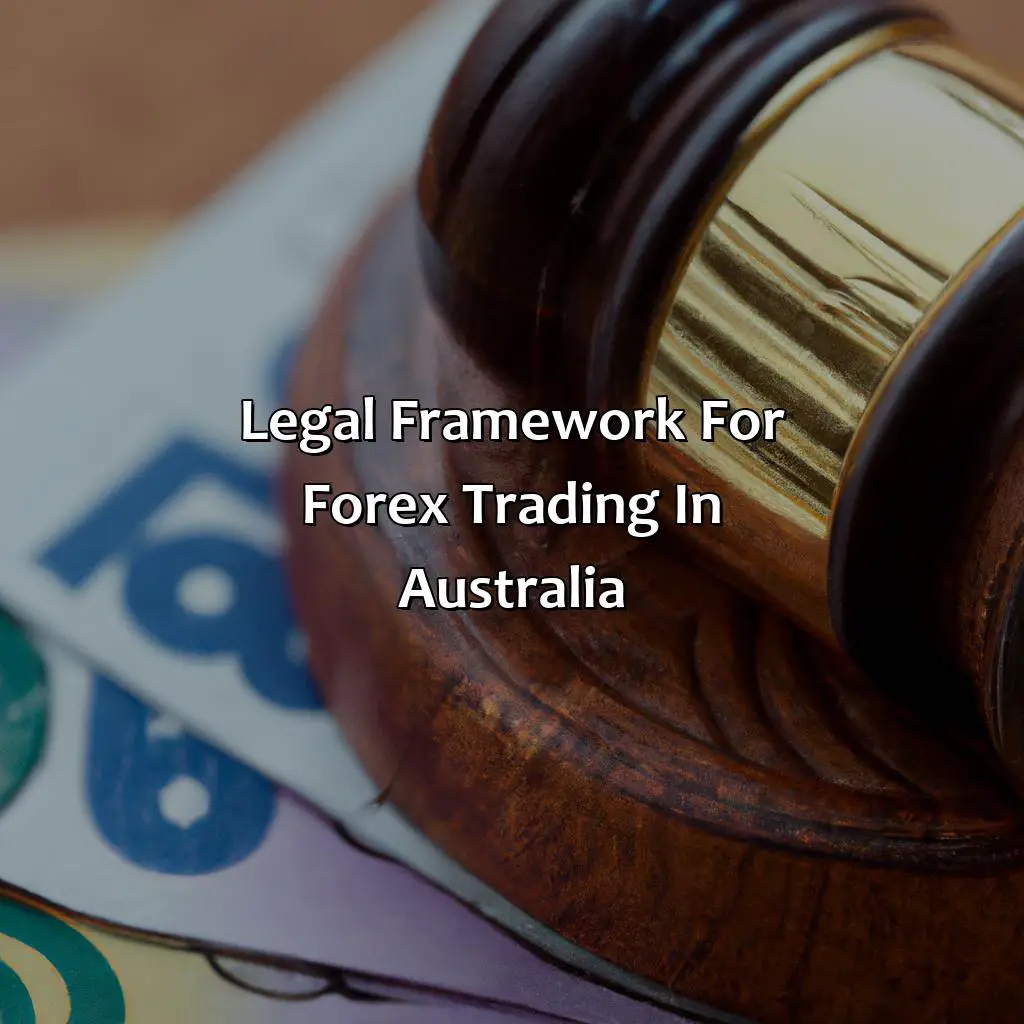
Photo Credits: forexbrokerreport.com by Douglas Garcia
To dodge any legal issues and understand the legal framework for foreign exchange trading in Australia, you must be aware of the forex regulations and investment laws. This article section aims to provide insights into the forex market legal requirements, forex regulatory compliance, and other forex legal information.
It has three sub-sections:
- Australian Securities and Investments Commission (ASIC) Regulations.
- Financial Ombudsman Service (FOS) and Australian Financial Complaints Authority (AFCA).
- Tax Implications on Forex Trading in Australia.
Australian Securities and Investments Commission Regulations
Regulations set by the Australian Securities and Investments Commission (ASIC) govern the forex trading industry in Australia. These regulations ensure that forex brokers in Australia operate in compliance with legal requirements. ASIC’s mandate includes ensuring the protection of forex investors and traders, promoting market integrity, and enforcing financial regulation.
Forex brokers must meet ASIC’s licensing requirements to operate legally in Australia. These rules aim to safeguard consumers’ interests, prevent fraudulent activities, and maintain market stability. Forex brokers must follow strict guidelines related to their operations such as managing client funds separately from their business funds.
ASIC also offers additional protections for consumers through external dispute resolution schemes such as the Financial Ombudsman Service (FOS) and Australian Financial Complaints Authority (AFCA). These organizations handle consumer complaints against authorized institutions or licensed brokers.
Investors involved in forex trading should be aware of tax implications on profits or losses from currency exchange transactions. The Australian Federal Government imposes capital gains tax on profits earned through foreign investment.
Proper risk management is essential when engaging in forex trading due to the high volatility of currency markets and leverage limitations set by regulators. Forex traders should also ensure they use secure trading platforms to protect their personal information and investments from fraudulent activities.
Pro Tip: Before engaging in forex trading, it is essential to understand the legal framework governing this industry, including regulatory requirements set by ASIC for licensed brokers and authorized institutions.
Getting a license to be a forex broker in Australia is harder than convincing a cat to take a bath.
Licensing Requirements for Forex Brokers in Australia
Forex brokers in Australia are subject to strict licensing requirements under the regulatory oversight of the Australian Securities and Investments Commission (ASIC) to protect consumers. To become a licensed forex broker, companies must comply with ASIC financial regulation, including having a qualified team of professionals, sufficient capital reserves, establishing an operational framework and maintaining appropriate risk management systems. The licensing requirements for forex brokers in Australia are designed to ensure that customers can trade with peace of mind knowing that they are being supported by an authorized and regulated entity.
Forex brokers in Australia must follow stringent protocols set forth by ASIC regulations, which include detailed financial audits and compliance checks to maintain their license status regularly. As part of these controls, forex brokers must report all client deposits accurately while assuring customer accounts are kept separate from the company’s accounts.
Trading with unlicensed brokers creates significant risks as there is no protection from the government or any other established legal body. In contrast, licensed forex brokers offer a level of security that ensures compliance with regulatory guidelines created by ASIC.
In one instance where a client had issues with their broker due to unauthorized transactions on their account, ASIC stepped in to investigate the matter and prosecuted the broker for fraudulent activities. Fortunately, thanks to their licensing requirements, the applicable compensation scheme adequately refunded affected clients up to AUD 500k per claim.
FOS and AFCA: Because even in the world of forex, complaints happen.
Financial Ombudsman Service and Australian Financial Complaints Authority
In case of any grievances or issues arising from Forex trading in Australia, traders can approach FOS and AFCA for resolution. These organizations serve as an intermediary between the trader and financial institution or broker to resolve disputes and investigate complaints. They have the authority to make binding decisions on compensation up to a certain limit, making them a reliable recourse for aggrieved forex traders.
When facing troubles with Forex transactions, Australian traders can seek recourse through FOS and AFCA. These bodies act as efficient channels of complaint redressal for traders, ensuring fair competition in the Forex market. FOS and AFCA provide expert opinions and insights into complaints against financial institutions, helping traders understand their legal rights while also assisting in finding a remedy.
Unique details about these entities include their statutory obligation to mediate disputes without favoritism towards either party. Moreover, these regulatory bodies enhance transparency by scrutinizing trade practices to protect consumer interests. In unforeseen circumstances when traders may face losses due to scams or frauds committed by brokers or other financial institutions, agencies such as FOS and AFCA assist in recovery of funds from defaulters.
Ensure efficient conflict resolution by leveraging through affiliates like FOS and AFCA– vital for attaining secure trade ventures that comply with regulation standards. As a wise trader, do not shy away from utilizing trusted sources at your disposal such as FOS and AFCA– deter fraudulent activities that could financially damage you significantly!
Looking to avoid tax implications on forex trading in Australia? Good luck with that one.
Tax Implications on Forex Trading in Australia
Forex trading in Australia has tax implications that must be adhered to for successful trading. Traders must report and pay tax on any profits made through forex trading. The tax implications on forex trading in Australia include capital gains tax, income tax, and goods and services tax (GST).
Capital gains tax is applied when a trader sells an asset at a value higher than the purchase price. In forex trading, traders are required to pay capital gains tax on profits earned through currency price fluctuations. Income tax applies to traders whose primary source of income comes from forex trading. GST is included in fees paid by traders to their brokers and must be taken into consideration while calculating taxes.
Traders should take advantage of professional accounting services, which offer specialized knowledge of taxation laws and can provide assistance with reporting obligations and deductions. Taxation laws vary based on individual circumstances; hence it is imperative that traders stay up-to-date with laws applicable to their situation.
Additionally, traders may consider incorporating their trading activities as a company or in a trust structure to obtain possible deductions eligible through Australian taxation regulations.
Proper adherence to tax regulations ensures sustainable profitability because non-payment of taxes may lead to payment of back taxes, high penalties, or even legal action against traders. Therefore, it becomes crucial for traders to have proper knowledge about IRS guidelines so as not only to minimize taxes but also ensure profitable outcomes through forex trading.
Forex trading in Australia comes with risks of volatility, leverage hindrances, security issues with trading platforms, and the looming threat of scammers and fraudulent activities.
Risks Associated with Forex Trading in Australia
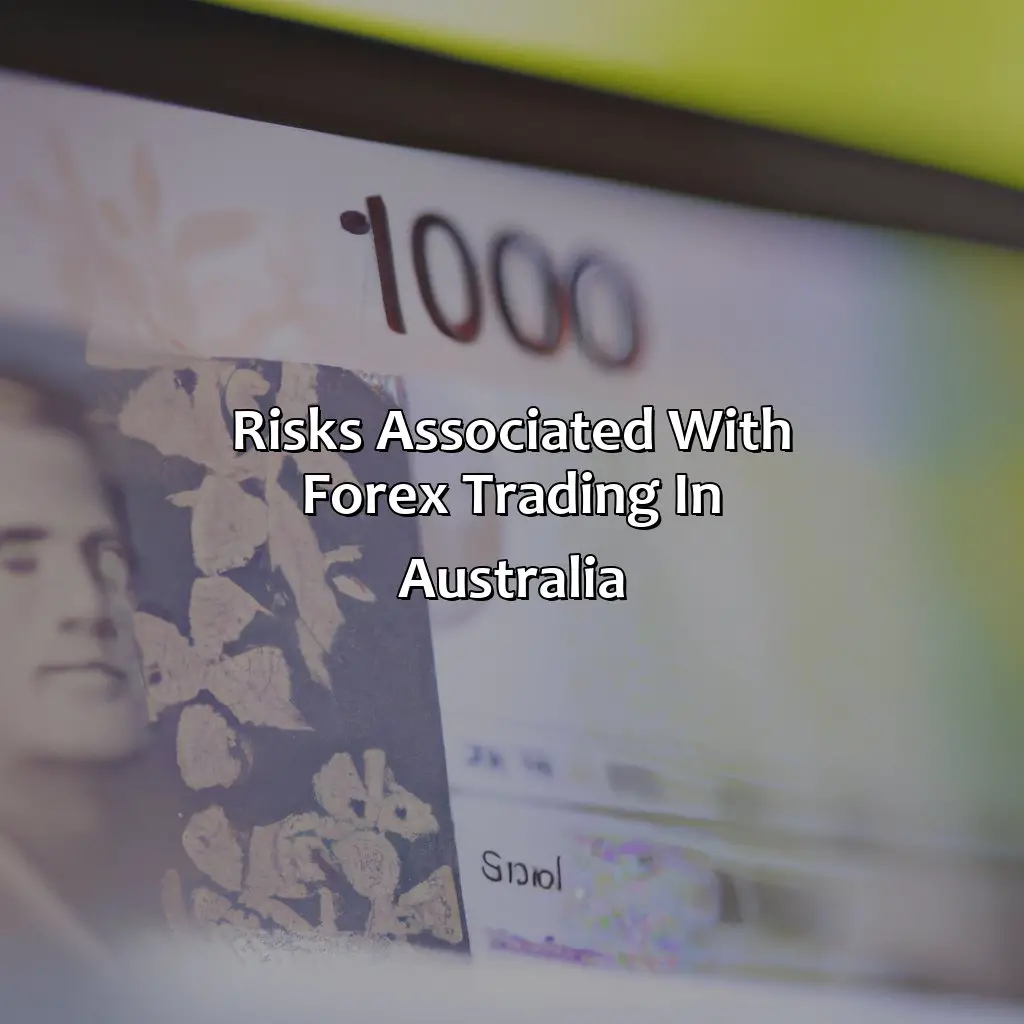
Photo Credits: forexbrokerreport.com by Wayne Nelson
Understand the risks of forex trading in Australia. Be aware of potential challenges. Tackle risks by learning about sub-sections like volatility and leverage. Understand security of trading platforms. Avoid scams and fraudulent activities. Consider forex risks before you jump into trading.
Volatility and Leverage Hindrances
The highly unpredictable nature of the foreign exchange market can pose risks for traders. Additionally, the use of leverage in forex trading can magnify these risks even further. As leverage is used to increase the potential profits, it simultaneously increases the potential losses for a trader. Therefore, volatility and leverage are essential factors that need to be considered carefully before starting forex trading activities.
To elaborate on this point, fluctuations in currency exchange rates are inevitable, and some currencies may showcase sudden and dramatic changes in their values within short periods. This high level of volatility can lead to significant losses if not managed appropriately by traders using effective risk management strategies.
Furthermore, leveraging positions may amplify profits and contribute to substantial returns. However, this strategy has an unfavorable dark side – connecting higher amounts of capital due to a margin call can result in liquidation of positions leading to massive losses for traders.
It is worth noting that volatility and leverage play an important role in forex trading; still, they are double-edged swords and require precision handling by investors who wish to be successful traders.
Wary traders should have a sound understanding of how volatile different currencies may be during different economic conditions or specific news events globally. Simultaneously, considering employing hedging methods or compensation techniques such as taking small positions is encouraged as it minimizes potential damage caused by market movements potentially beyond one’s control.
Protect your investments and your peace of mind with secure trading platforms in the unpredictable world of forex.
Security of Trading Platforms
Ensuring the safety and security of trading platforms in the forex market is a crucial concern for traders. Fraudulent activities, unauthorised access, and information breaches can all lead to significant financial losses. Therefore, brokers need to provide top-notch security measures to protect client assets and enable secure online transactions. Moreover, various security features such as two-factor authentication, data encryption, and firewall protection must be implemented to safeguard personal information and prevent hacking incidents.
In addition to providing high-grade security measures, Forex brokers need to ensure regular maintenance of their trading platforms to avoid system disruptions or crashes that may lead to substantial losses. Furthermore, adequate backup systems must be put in place in case of any unfortunate events like power outages or physical disasters. These contingencies assure traders that their transactions will not be affected by any infrastructure failure that may arise.
Moreover, it is crucial for traders to conduct due diligence before selecting a broker. This process involves researching the credibility of the broker’s security protocols through reviews or investigations from reliable sources. The Australian Securities and Investments Commission (ASIC) regulates brokers and offers advisory services on safe trading practices.
According to a recent report by Finance Magnates Intelligence Department (FMID), forex trading activity among Australian retail investors increased by 62%, reaching an average monthly turnover of $288 billion in April 2020 compared to December 2019.
Don’t let scammers and fraudulent activities ruin your Forex trading journey in Australia – stay informed, stay safe.
Scammer and Fraudulent Activities
With forex trading being a highly lucrative market, scammers and fraudulent activities have been observed in Australia. They target inexperienced traders with authenticity scams like fake signals or manipulation of prices leading to loss of investments. Investors must ensure that the forex broker is registered under ASIC, and conduct thorough research to avoid any investment scams.
In addition to authenticity scams, there have also been reports of phishing attacks and unauthorised access to trading accounts leading to loss of funds. It is crucial for investors to adopt strong passwords and enable two-factor authentication while engaging in online forex trading activities.
Investors should also be aware of “pump-and-dump” schemes, where scam artists manipulate smaller forex markets by inflating the price of certain currencies with misleading information only to sell them at a profit leaving others with losses.
Ensure regular monitoring of account activities and immediately report any suspected fraud cases or unauthorized access issues to the financial ombudsman service (FOS) or Australian financial complaints authority (AFCA).
Beware before investing in Forex Trading, investors must keep an eye on fraudsters who tempt them with high-profit claims that seem too good to be true without adequate justification for such returns. Stay vigilant and regularly update yourself about fraudulent activities in the market.
Forex trading in Australia offers access to the global market, high liquidity, flexibility, and potential for high profits, making it a lucrative choice for traders.
Benefits of Forex Trading in Australia
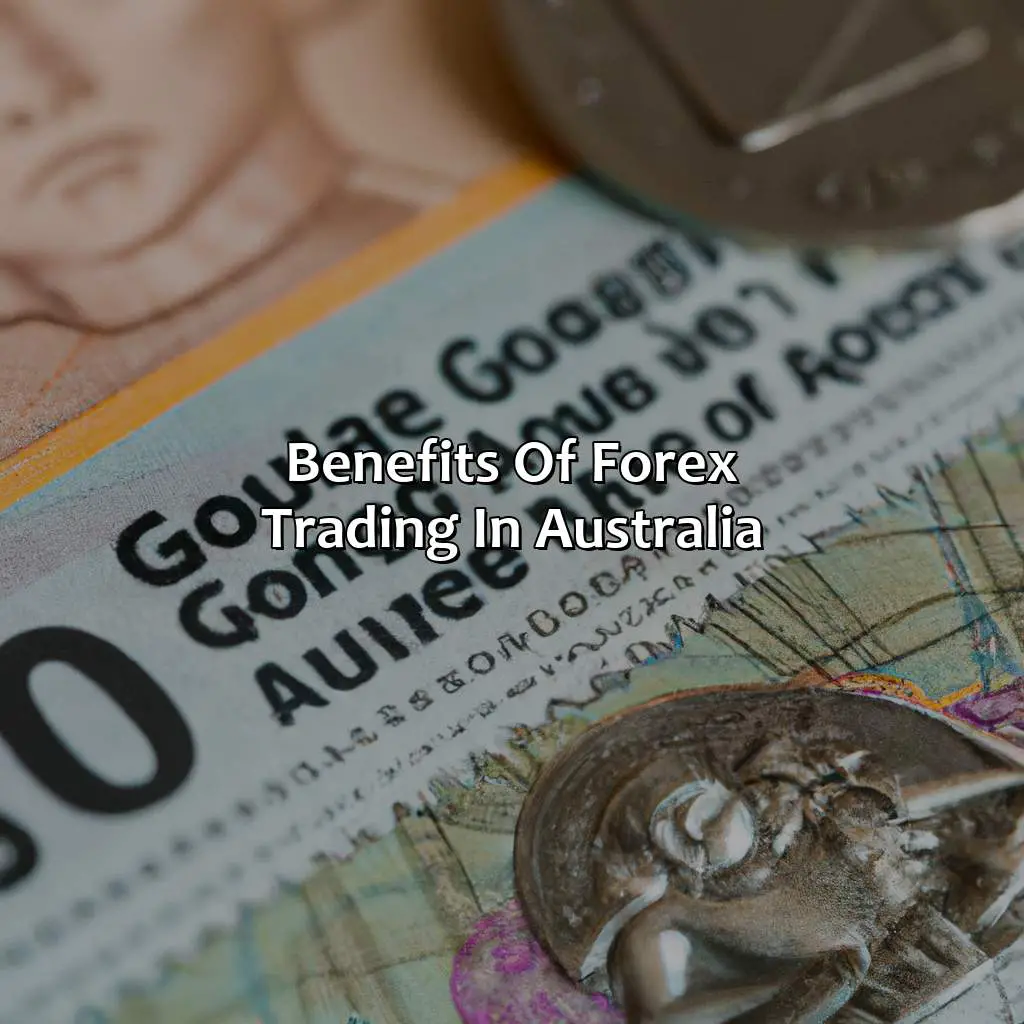
Photo Credits: forexbrokerreport.com by Donald Taylor
Reap the benefits of forex trading in Australia! Especially in the global forex market. It has high liquidity and flexibility. Plus, potential for high profits. To access the market, read this section. Learn about the advantages of trading in the global forex market. High liquidity? Check! Flexibility in choosing trading time? Check! Potential for high profits? Double check!
Access to Global Forex Market
Accessing the global forex market from Australia is relatively easy and convenient for traders. With the use of online trading platforms, traders can easily connect with international markets and trade various currency pairs. The forex market operates 24 hours a day, five days a week, making it easy for Australian traders to participate in the global forex market.
Moreover, Australian forex brokers offer access to major international financial markets such as the US, UK, Asia-Pacific and more. This allows traders to tap into different market conditions, further increasing their profit potential.
In addition to this, with the high liquidity of the forex market, there is an abundance of buyers and sellers at any given time. As such, traders can execute trades quickly and efficiently with minimal slippage.
To maximize profits when trading on the global forex market from Australia, traders need to stay informed about market conditions and trends. It’s essential to keep up-to-date with financial news and events across international markets that may affect currency prices.
To conclude, access to the global forex market in Australia is quite simple via online trading platforms provided by qualified Forex brokers. A trader must take advantage of high flexibility and liquidity while keeping an eye on any economic changes at all times to achieve maximum profitability.
Forex trading in Australia offers high liquidity and flexibility, making it the perfect market for those who enjoy the rush of volatility.
High Liquidity and Flexibility
Forex trading in Australia offers a high level of liquidity, which means that traders can easily buy and sell currencies with minimal price discrepancies. This high liquidity is due to the sheer volume of transactions that take place on a daily basis in the global Forex market, allowing traders to access various currency pairs with ease. Additionally, Forex trading platforms offer great flexibility as traders can easily open and close positions based on their analysis and market movements.
Furthermore, this flexibility allows traders to trade at any time during the week, as Forex markets operate 24 hours a day from Monday to Friday. The ability to trade across multiple time zones provides traders with ample opportunities to profit from different market conditions and news events across the world.
In addition, traders can utilize various tools such as stop-loss orders and limit orders to manage risks while simultaneously benefiting from high liquidity and flexibility offered by the global Forex markets. These tools allow traders to set predetermined entry and exit points which can be automatically executed once reached.
Overall, by leveraging high liquidity and flexibility in Forex trading, traders have a better chance to capitalize on market trends while efficiently managing their risk exposure. Forex trading in Australia offers the potential for high profits, but only for those who are willing to put in the time and effort to learn and implement effective trading strategies.
Potential for High Profits
Forex trading in Australia brings forth significant opportunities for investors to make high profits. Forex trading has a potential for high returns on investments due to the volatile nature of the global currency market, which can lead to substantial gains. The forex market provides traders with flexibility and an opportunity to leverage deals with minimum investment, increasing their chances of making profits.
Moreover, advanced technology has allowed forex traders to access innovative trading tools and strategies that aid in profitability. Through proper analysis and management of risks, traders have the potential to reap significant rewards through high-profit margins.
In addition, some stories from forex traders indicate massive payouts during favourable market conditions; however, these conditions may not always persist long-term. It’s critical for forex traders to be mindful of the inherent risks associated with forex trading and properly manage their funds while actively seeking ways to promote profit-making opportunities without compromising reliability or security.
Five Facts About Forex Legalities in Australia:
- ✅ Forex trading is legal in Australia, but it is regulated by the Australian Securities and Investments Commission (ASIC). (Source: ASIC)
- ✅ Retail forex trading is considered a high-risk activity, and ASIC requires brokers to provide appropriate risk warnings and disclosures to clients. (Source: ASIC)
- ✅ Brokers operating in Australia must hold an Australian Financial Services (AFS) license and comply with strict regulatory requirements. (Source: ASIC)
- ✅ Australian forex traders are protected by the Financial Ombudsman Service, which provides a free and independent dispute resolution service. (Source: Forex Brokers Australia)
- ✅ The Australian dollar (AUD) is one of the most traded currencies in the world, and the country has a strong and stable financial system. (Source: FXCM)
FAQs about Is Forex Legal In Australia?
Is Forex trading legal in Australia?
Yes, Forex trading is legal in Australia. However, it is important to ensure that you comply with all relevant laws and regulations, including tax rules.
Do I need to pay taxes on Forex trading in Australia?
Yes, Forex trading is considered taxable and is considered assessable income. Therefore, it must be included in your tax assessment for the relevant tax assessment year.
What is the tax deadline for Forex trading in Australia?
The tax deadline for Forex trading in Australia is generally October 31st of each year.
How can I ensure that I am complying with all relevant tax rules for Forex trading?
You can consult with tax experts and ensure that you keep accurate records of all your trading activities, including Forex pairs traded and any profits or losses incurred. This will help you with tax computation and ensure that you meet the tax deadline.
Can I engage in retail Forex trading in Australia?
Yes, retail Forex trading is legal in Australia. However, it is important to only trade with reputable brokers and ensure that you understand the risks involved in trading Forex.
Are insurance companies and Central Banks involved in Forex trading in Australia?
Yes, insurance companies and Central Banks are some of the major players in the Forex market in Australia. Their involvement can have an impact on the exchange rates of various currency pairs.


